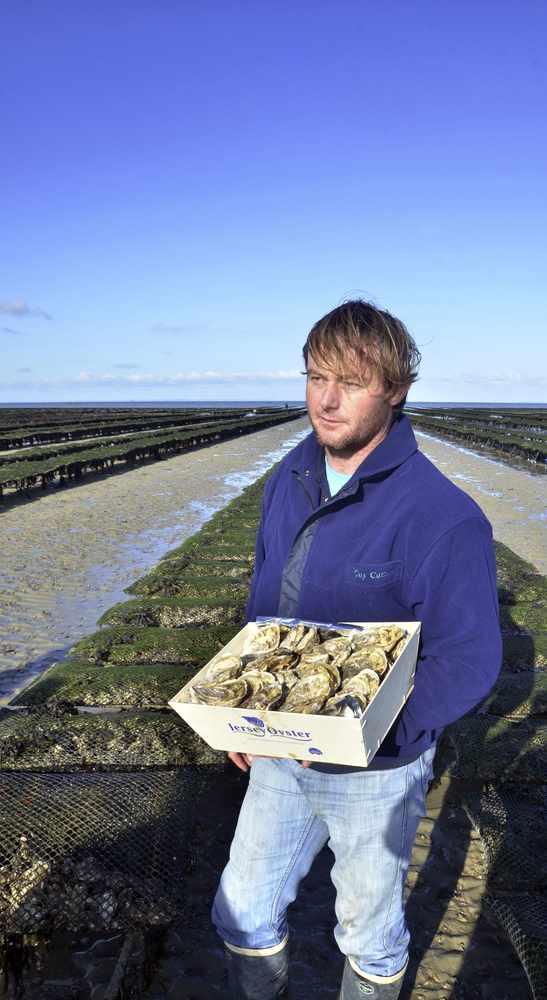- Thousands of tonnes of Jersey produce is exported around the world every year
- It reaches far-flung places such as China, Venice and Burma
- Produce includes potatoes, milk, black butter, plants and seafood

Bob Jones, head of marketing and export at Jersey Dairy, said that the UK supermarket price wars had forced the company to look at exporting their products elsewhere.
He said: ‘We decided to investigate Asian markets which were experiencing exceptional growth for imported high-quality food products. In China, where there had been problems of contamination of dairy products in the supply chain, food safety was a very important issue and dairy products from Jersey were seen as being very safe for consumption.’
Mr Jones said that he was very pleased with the way that the export market had grown since the opening of dairy’s processing facility in 2010.
‘The sales value of our exports from Jersey has grown from just £750,000 to £3.5 million in the last four years, and we expect this to double again in the next two to three years,’ he said.
He added that the company had plans to break into other markets.
‘We are keen to target other Asian markets, including Malaysia and Indonesia,’ Mr Jones said, ‘and we are also looking at the Middle East and Africa’
Managing director Tim Crowley said: ‘Black butter is easily our biggest export – we moved 20,000 jars out of the Island in 2014. It mainly does to Germany, Japan and the UK.
‘We recently recruited a business development and marketing executive and about 50 per cent of what they do will be done out of the Island.
‘The drive is on the foreign market, with China being a target.
‘In essence, I believe that in order for a locally made product to be successful in overseas markets, it has to be something special, something niche.
‘The biggest cost by quite a long way is getting the products over the Channel.
‘One product that we are looking into exporting in two to three years is cider. The trees have been planted and that business should go online in a few years.’
La Mare Wine Estate was established in 1972 by a man named Robert Blayney.
It contains historic buildings, sweeping vineyards and orchards, a winery, distillery and kitchens, all of which are used to manufacture food and goods from Jersey produce.
AQUA-MAR FISHERIES
Manager Natalie Porritt said that the company exports about four tonnes of produce a week during the summer.
‘Just one day this week we exported one tonne, and during Christmas and Easter it tends to pick up quite a bit,’ she said.
‘We ship the stock to St Malo, still live in trays, where it gets transferred onto two trucks that we have over there. From there, a little stays in St Malo but the majority of it gets driven down to Venice, Lisbon and northern Spain – Barcelona, that kind of area.
‘We have been exporting shellfish from Jersey as an independent company since 1995. It is quite straightforward importing the produce into Europe. We have to get clearance from Customs in St Malo and we have had a few hiccups in the past, but now it is fairly simple.’
JERSEY CHOICE
Chief executive Tim Dunningham said that the business sells a variety of shrub,s from very small plug plants to pre-planted hanging baskets.
‘Each year we send 800,000 packages to the UK by post,’ Mr Dunningham said. ‘I think we are the only people left in the Island sending substantial quantities of post north-bound.’
Asked why the business operates out of Jersey, Mr Dunningham said: ‘There are a few reasons, one being that the light levels in Jersey are slightly better than in the UK.
‘The cost of delivering the products to the UK mainland is also fairly similar to what it would cost if we were dispatching them in the UK.
‘Unlike some other businesses in the Island who have to import goods and then export them again, we grow all our produce in the Island. In short, there is no economic reason not to remain here.’
[figure caption=”Mark Crowther, director of the Liberation Group, said that the company’s real success story was Liberation Ale.
‘We export it to major pub chains like Wetherspoons, where they generally feature it as a guest ale,’ he said. ‘Recently we secured another contract with Wetherspoons to supply 90,000 pints of Liberation Ale.
‘Obviously, at that volume there will be a considerable number of people who will see the Jersey name and flag on the beer, which I think, in terms of publicity, is really good for the Island.
‘So far we have exported three-quarters of a million pints of beer out of the Island, and we hope to hit the one million pint mark in 2016.
‘Currently, we only export to the UK, but we are keen to explore other markets. We’ve had some really good responses from people in the UK – they think it is not just a normal beer when they see that it’s from Jersey.’” title=”Crowther” align=”right” url=”/?attachment_id=1429461″ id=”1429461″ size=”100″]

The owner of the Jersey Oyster Company, Chris Le Masurier, said that they exported upwards of 800 tonnes of oysters a year. Most of their produce goes to France and about 15 per cent to the UK.
Mr Le Masurier said the business had plans to expand. ‘We are currently dealing with the transition from wholesale to packaged,’ he added.
‘At the moment, when we export our oysters to France, once they are there, a large amount of them are packaged and re-branded as French before being distributed around the world.
‘We have plans to package them here instead and sell them direct to other international markets, including China, Hong Kong, the Middle-East and Dubai.
‘In fact, we are a week away from beginning exports to Switzerland.’
Unlike other Island exporters, the company transports the vast majority of its stock on its own vessel, a former military landing-craft, the Normandy Trader. Mr Le Masurier said: ‘Currently, the vessel is running weekly to Granville.’
Asked if he had ever experienced problems exporting to Europe, Mr Le Masurier said that it was a fairly complicated process. He said: ‘It is not so much the expense, but the formality and process. From a hassle point of view, it is a slight disadvantage.’
Charlie Gallichan, director of Woodside Farms, said: ‘We export various products around the world, generally to France, Belgium, the UK and the United States.’
Mr Gallichan said that he was constantly trying to expand the business, particularly in the American market.
He said: ‘The export market makes up a substantial part of the business’s overall revenue – it is probably around 65 per cent. It used to be a lot more than that, but the business has changed quite a lot over the last few weeks, with us filling the gap after the closure of Amal-Grow.
‘They didn’t export any vegetable stocks, but our plan is to maximise local production and then export any surplus stocks to the UK. We would do this by using our existing trade links.’

Phil Le Maistre, a director of Jersey Quality Produce, said: ‘We supply category managers, similar to wholesalers, with a range of organic produce, including courgettes, tender-stem broccoli, cauliflowers, beans and potatoes. ‘They then go on to supply products to the UK supermarkets and a number of other businesses.’
Mr Le Maistre added that for the first time this year, the company was planting organic tender-stem broccoli in partnership with farmer Steve Carter. ‘We are only doing it on a small scale this year to make sure all the figures stack up, but hopefully it will be on a larger scale in the future,’ he said.






